Take the HONESTY TEST with me…
Editor Let’s face it – we all lie. Yes we do. When you don’t tell it as it is, you are lying. That little white lie is a sin we

Let’s face it – we all lie.
Yes we do. When you don’t tell it as it is, you are lying. That little white lie is a sin we commit so many times each day that we often lose count. When you tell your secretary to say you are in a meeting when you are actually at your desk, you are lying. When the phone rings and your son calls you to answer it and you tell him to say you are not in, you are lying. How many lies have you told since you woke up this morning? I bet many. Why do I say so? Because sometimes we don’t think sugarcoating the facts or altering facts to suit the desired results is being dishonest.
Think about various situations we often encounter and are not exactly honest. Examples:
A friend walks in wearing this hideous blonde weave and she asks you what you think. You don’t want to hurt her feelings so you tell her she looks good, or you take the middle ground and say you like her short hair better, but the weave is okay. Either way you are not being honest. You are trying to validate your friend’s opinion, as she must have liked the weave to choose it. We often lie to keep safe instead of being honest and saying exactly what we feel.
Perhaps the most lies we tell are to those closest to us – our children and significant other. You know the path your child is taking is not good for them but instead of being honest, you beat around the bush without exactly stating the words that should come from an insightful parent’s mouth. Why? Because you don’t want to hurt their feelings or your relationship with them. Your partner is treating you unfairly but instead of being honest and telling them how you feel, you pretend all is well. Why? Because you don’t want to rock the boat.
Or you have been on the same job for five years without a promotion or a decent pay raise and you know your performance and attitude may be the issues and instead of tackling them, you continue to lie to yourself that things will be better next year. You wake up each morning to go to work angry for not getting what you think you deserve, and afraid you may lose your job. Anger and fear are emotions that make us lie. Here comes the favourite lie: “Traffic was a nightmare” each time you are late for an appointment. Granted traffic is bad in the city of Nairobi, most of us use this white lie to cover a major weakness in time keeping. Why can’t you be honest and work on this weakness? And if a friend keeps you waiting and tells you this obvious lie, be honest and let them know how you feel. If they are not willing to change decide to stop putting yourself in situations with people who disappoint you.
And what about when you are clueless about what is being discussed and when asked for your opinion you go something like: “I agree with so and so…” repeating exactly what has already been said. When you don’t know something, the simplest and most productive way to communicate that is with three simple words: “I don’t know.” You are being honest and open to learning something. People often tend to act like they know something in order to bolster their self-esteem. But you need to be realistic – nobody is an expert on everything and honesty is a virtue.
A final common one. A relative or friend asks you for a favour you are unwilling or unable to give but because you don’t want to upset them, you do it grumblingly. When you are honest, you set limits and clear boundaries, which you expect others to respect. You shouldn’t let people make you uncomfortable because of speaking the truth.
Sometimes we don’t lie because we mean to lie, but because it is convenient. Depending on how you handle situations, you fall in any of the three parameters of the honesty meter. You are wishy-washy when faced with unsettling situations and have a tendency to mask your true feelings. But in trying to prevent people from reacting negatively to, or being hurt by what you have to say, you are basically just lying to them, and to yourself. Sugarcoating statements comes from fear. But if you live your life in fear, never telling people how you really feel or what you really want, you wind up compromised and with a lot of unmet needs.
You are frank and fair when you tap into your feelings and determine the most constructive way to convey your feelings without being too domineering or submissive. Truth telling over time makes you more loving and less fearful. You are expressing how you feel for the sake of better relationships. Ultimately, people appreciate you for caring enough to be honest with them.
You are brutally honest when you don’t mince your words when telling the truth. While this is better than not speaking up at all, you may be doing more harm than good by being too overbearing. Try to express your feelings in ways that don’t hurt. Always speak honestly from your heart and choose the right words.
Published in March 2015




